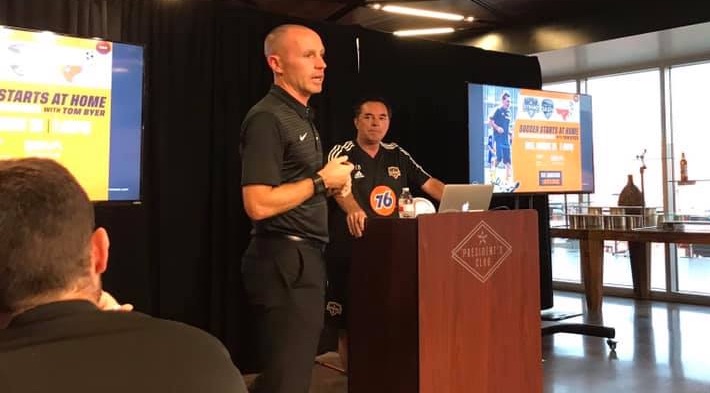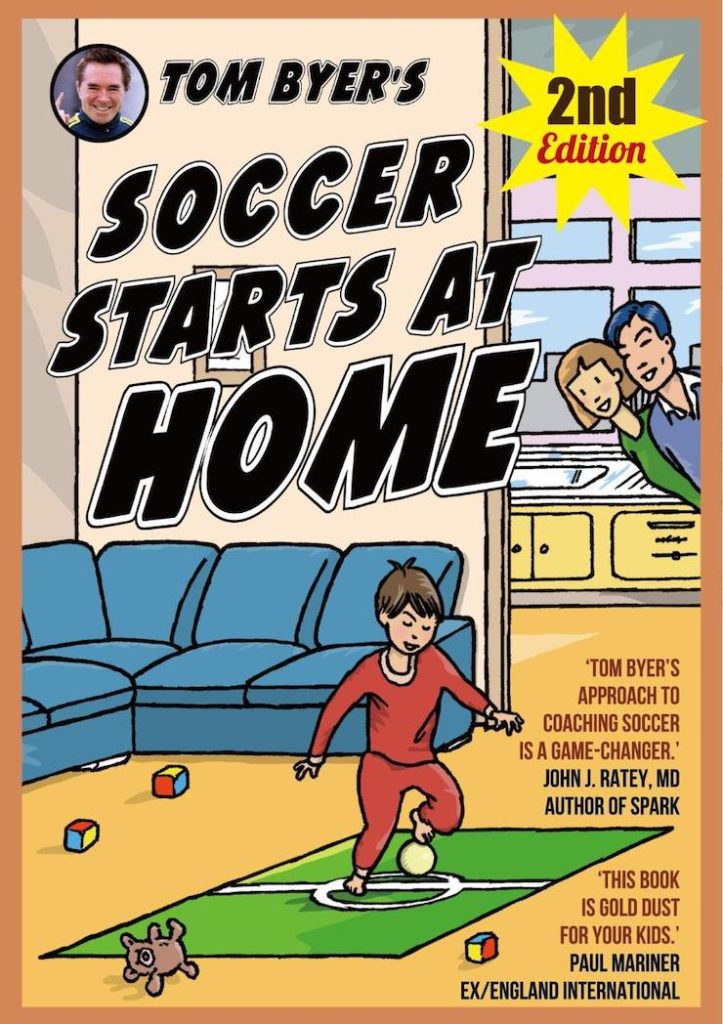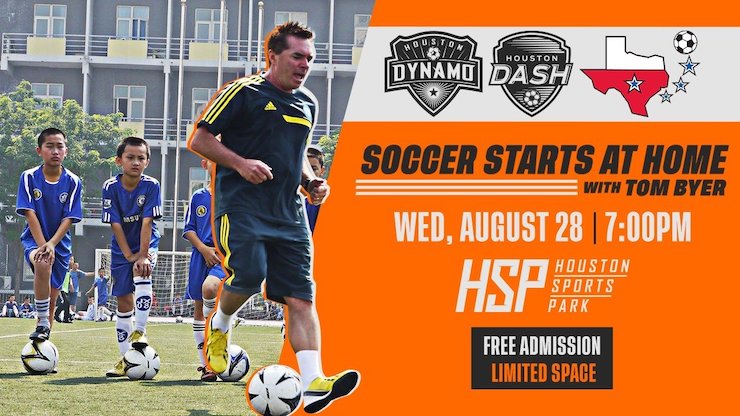When Should Kids Start Being Comfortable With A Soccer Ball?
World-renowned youth soccer trainer Tom Byer brings his “Soccer Starts at Home” to the Houston Dynamo / Dash.
Maybe it requires a mind-shift. Maybe it just requires a flash of common sense. Just perhaps it is logical … the idea that soccer starts at home.
World-renowned youth soccer guru Tom Byer believes that it is unfair to send little kids off to join a soccer team when they have not had time practicing with a soccer ball at home. Byer’s book “Soccer Starts At Home” is now in its second printing and has been translated into a ton of languages.
“It is all about getting kids comfortable with the ball before they cross over to organized play, which is usually around the age of six years old.”
Tom Byer “Soccer Starts at Home”
Byer’s approach is beautiful in its simplicity. Soccer Starts at Home focuses on the value of having young kids become comfortable with a soccer ball. The world is used to seeing pictures of famous players kicking a soccer ball as soon as they could walk.
According to Byer, there has been extensive research clearly proving as soon as a child can walk, they are ready to learn advanced motor skills — and this is the perfect environment for many kids to develop their confidence.
“In the comfort of their home with their loved ones, young kids make the greatest advancements and really learn to love the ball. The best players in the world followed this path of development.”
The controversy over Byer’s approach seems to be the vital role he believes parents have in this early development. The questions really should be: ‘Why shouldn’t parents, the ultimate champions of their kids, encourage this?’
“Tom Byer’s Soccer Starts At Home is a game-changer — A revolutionary approach to developing better soccer players in America.”
John J. Ratey, M.D., Harvard Medical School’s Associate Clinical Professor of Psychiatry
Referred to as a soccer guru by ABC as well as by Japan’s Women’s National Team players — as well as many others, Byer partnered with Houston Dynamo/Dash earlier this year and just completed a series of training sessions last week.
The MLS’ Houston Dynamo is ultimately focused on developing homegrown talent and taking each individual to the next level — and it all starts when players are young. Partnering with Byer opened the pathway to really communicating and teaching the youngest level of potential professional players of tomorrow.
Diane Scavuzzo’s Interview with Tom Byer
Diane Scavuzzo: What is your program with Houston Dynamo-Dash?
Tom Byer: We are working with the Houston Dynamo-Dash and have agreed on a 3 year period to establish our “Soccer Starts at Home” Program.
From president, John Walker to everyone else who works for the Club, everyone is aligned with what we are trying to accomplish. The entire organization has been fantastic! Every day we are busy connecting with the Houston community and have been provided all the resources we need.

Houston Dynamo Academy Director, Paul Holocher is such a pleasure to work with. Responsible for so many different teams, from the youngest up to the U19’s and Reserves, Paul is so hands-on and shows up to every event.
Former legendary pro, Brian Ching whose career in the MLS spanned twelve years, with eight on the U.S. Men’s National team, reached out to me first and has been so supportive. We have even
Diane Scavuzzo: Is there resistance to the philosophy of Soccer Stars At Home?
Tom Byer: Culturally, we are often programmed to believe that a child’s athletic and skill development begins only after they sign up with a sports’ program, which often takes place at the ages of 6 years old.
This discounts the massive amount of development that begins before the age of 6 years old.
Soccer Starts at Home, shares a very simple, but unique and forward thinking message, that soccer skills can and should begin at home.
At the heart of our message and approach is the important role parents have in the lives and development of their young kids.
This is still an under-appreciated age here in the United States.
There are significant cognitive benefits to focusing on ball mastery from a very young age, which helps in building neural pathways to the brain.
I have been collaborating with some of the biggest experts in the world including Dr. John Ratey, Associate Professor from Harvard Medical School. Dr. Ratey is one of the leading Neuropsychiatrists in the world. A child’s need for parental approval is one of the main staples of the program. This is at the core of our concept and what we teach to parents.
When a child is playing inside or around the home this is a very safe protected environment away from ridicule.
A child can experiment doing many things without fear of failure.
This in turn creates a supercharged environment where deep learning and longterm memory takes place.
When a small child can learn or master a skill, it builds belief in oneself. If this can be accomplished by the age of 5 or 6 years old — it is a big deal, even if the child never goes on to become a soccer player.

“Exercise involving technical skills stimulates growth in the brain and this growth reciprocates by improving those skills. The more you do, the better you get.”
John J. Ratey, M.D., Harvard Medical School’s Associate Clinical Professor of Psychiatry
We’re not so much a youth soccer program, but a developmental message backed by research and science.
Our message recognizes that all advanced soccer nations begin their ‘culture of development’ much earlier than when most kids in America join a team, which is at the age of six to seven years old.
The key influencers of early development begins with the parents.

Our strategy is to connect with the community with as many stakeholders as possible and show them what we are trying to accomplish. We have begun doing this by holding “Ignition Events.” The Dynamo has an outreach program called “Partners in Development” and we are working with this MLS club to reach as many parents as possible and share with them our message that “Soccer Starts at Home.” It’s a process which I often compare to being a marathon, not a sprint.
Diane Scavuzzo: MLS Clubs are dedicated to developing homegrown players and lifelong soccer fans—how does your program fit in well with these objectives?
Tom Byer: We are dedicated to changing the “Entry Level” of the game —before a child ever crosses over the line into organized play and competition. This is before thinking about Elite Player development.
We must close the gap between the very best and those still yet to develop at the youngest ages if we are to create a much larger Elite Player Pool from which we will develop more homegrown players.
This a long-term project for our Greater Houston community and youth. Free for participating schools- we hope to activate early Parental engagement, including realizing the many cognitive benefits of skill acquisition! @HoustonDynamo @Tomsan106 @NeffECC #SoccerStartsatHome pic.twitter.com/qMXsJCzBUe
— Paul Holocher (@HolocherPaul) August 29, 2019
UEFA has done research that show the correlation between countries that have a very healthy eco-system of people playing the game to the amount spent on ticket sales.
People who are currently playing soccer spend way more on match tickets than people who used to play and significantly more than people who have never played.
People who play the game also spend much more on soccer merchandise than people who use to play or who have never played. This is quite a significant motivator for professional clubs and their Sales and Marketing executives who are trying to put fans in the stadiums.
Tom Byer’s book, “Soccer Starts At Home” is available by clicking HERE





